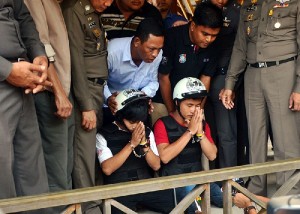JOURNALISTS FORBIDDEN TO TAKE NOTES MEANT FULL RIGHTS TO PUBLIC HEARING IMPAIRED
A report by Solicitors International Human Rights Group has quietly condemned Thailand’s justice system after monitoring the trial of Burmese Zaw Lin and Wai Phyo for the murder of Briton David Miller and murder and rape of Hannah Witheridge.

Couched in polite terms the group calls on the authorities to allow the media to take notes and provide contemporaneous coverage of court cases, calls for better training of lawyers, asks for proper state aid for defendants, and an overhaul of the criminal code in relation to disclosure.
As the journalists were not allowed to take notes the defendants full rights to a public hearing were not complied with.
It also recommends an overhaul of procedures at police stations, a requirement that judges confirm the burden of standard of proof in each case, a review of the documenting of exhibits, a review of the standard of analysis and reporting in DNA cases, training and retraining of advocates, as well of course as the abolition of the death penalty.
This would appear to conflict with a statement in which they also said that the defendants rights to an impartial tribunal were complied with.
But in short we can now discard the claim by Thailand’s police chief that Thailand’s police officers read from the same books as Scotland Yard, and we can assume that the Thai justice system was significantly flawed in the Koh Tao case and that the judges had not given a proper account of their decision to condemn the two Burmese.
I could have added also the recommendation that a verbatim transcript must be taken of ALL court proceedings; that laws making judges infallible be revoked and criticism of judges’ decisions be allowed; and that the assumption of innocence also be applied.
I could further add that Royal Thai Police also be held to their promises to abolish crime re-enactments, and that the court system to be amended to allow continuous trial (ie day after day) rather than sitting one day a month or two in each case. This was promised but abandoned in all but high profile cases, or ones receiving international attention. Justice delayed is of course, justice denied.
The problem of course with Thailand is that promises have been made to overhaul the justice and education for years but those promises have never been kept by any of the political parties, and the current government has regressed both issues in the interests of national security.
The SIHRG recommendations are as follows – but you can read their full report at this link – which also includes the judgement.

Recommendations:1. An overhaul of the procedures for providing independent legal advice at police stations. There should be funding for the training of lawyers to carry out the role ofclient centred legal advisers to detainees at police stations. Also funding for lawyers to carry out this role.
2. We recommend that the Thailand Government institute an accessible system of Stateaid for the defence of serious cases where the liberty or life of the accused is at jeopardy and the accused does not have the means to meet the costs of his or her own defence.
3. An overhaul of the criminal code in relation to the prosecution duty to disclose evidence it relies on and disclosure of evidence in its possession that may assist the defence.
4. A requirement for all judgements in criminal cases to confirm the burden andstandard of proof the Court is applying.
5. A review of procedures concerning the documentation of the movement of all exhibitsin a criminal enquiry.
6. A review should take place with world experts on the current standards of analysisand reporting in DNA cases with a view to producing guidelines for all experts working for the criminal justice system in Thailand. The Appeal Court could receive international expert assistance and issue guidelines.
7. Training and regular retraining in trial advocacy for Thai lawyers should beimplemented by the responsible bodies.
8. We recommend an amendment to the Criminal Code permitting bona fide journalists,legal commentators and international observers the right to take contemporaneous notes of court hearings in Thailand. This is consistent with the requirement for “open justice”.
9. We recommend that a reasonable limit to the length of a day’s hearing in trials beprovided for in the Criminal Code of Thailand.
10. We recommend the abolition of the death penalty. Even if the trial process is upheldon appeal and putting to one side whether the Defendants were correctly convicted,this is the sort of contested case where new evidence can arise and point away from guilt. Future corrections or exonerations are meaningless if the accused are dead.





All good points, Drummond. Thailand my get a bit closer to a decent-quality justice system, in fits and starts, over the coming decades. Yet, even at its comparative best, it will continue to shield the privileged classes, while scapegoating those at the lowest rungs of the social ladder.
Is that comment above to be considered a minority statement? “The defendants rights to an impartial tribunal were complied with.” Can’t wait to see how FB “Justice…” defenders are going to spin that one.
Welcome back to the non-VPN internet, Andrew.
This comment is carried over from andrew-drummond.com.
“A lack of “Impartiality” of a court requires evidence of, for example, a personal link to one of the parties to the case or manifest prejudice during the court hearings. A judge making court rulings that one party contests is not in itself evidence of impartiality. In this case there was no evidence of “impartiality” in the narrow sense.”
Lionel Blackman SIHRG Report Author